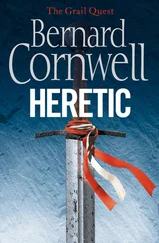‘Will we attack them?’ the young monk summoned up the courage to enquire.
‘Dear me no, I do hope not,’ Lord Outhwaite said. ‘We’re outnumbered! Much better to hold our ground and let them come to us.’
‘And if they don’t come?’ Thomas asked.
‘Then they’ll slink off home with empty pockets,’ Lord Outhwaite said, ‘and they won’t like that, they won’t like it at all. They’re only here for plunder! That’s why they dislike us so much.’
‘Dislike us? Because they’re here for plunder?’ Thomas had not understood his lordship’s thinking.
‘They’re envious, young man! Plain envious. We have riches, they don’t, and there are few things more calculated to provoke hatred than such an imbalance. I had a neighbour in Witcar who seemed a reasonable fellow, but then he and his men tried to take advantage of my absence when I was Douglas’s prisoner. They tried to ambush the coin for my ransom, if you can believe it! It was just envy, it seems, for he was poor.’
‘And now he’s dead, my lord?’ Thomas asked, amused.
‘Dear me, no,’ his lordship said reprovingly, ‘he’s in a very deep hole in the bottom of my keep. Deep down with the rats. I throw him coins every now and then to remind him why he’s there.’ He stood on tiptoe and gazed westwards where the hills were higher. He was looking for Scottish men-at-arms riding to make an assault from the south, but he saw none. ‘His father,’ he said, meaning Robert the Bruce, ‘wouldn’t be waiting there. He’d have men riding around our flanks to put the fear of God up our arses, but this young pup doesn’t know his trade, does he? He’s in the wrong place altogether!’
‘He’s put his faith in numbers,’ Brother Michael said.
‘And perhaps their numbers will suffice,’ Lord Outhwaite replied gloomily and made the sign of the cross.
Thomas, now that he had a chance to see the ground between the armies, could understand why Lord Outhwaite was so scornful of the Scottish King who had drawn up his army just south of the burned cottages where the dragon cross had fallen. It was not just that the narrowness of the ridge confined the Scots, denying them a chance to outflank the numerically inferior English, but that the ill-chosen battlefield was obstructed by thick blackthorn hedges and at least one stone wall. No army could advance across those obstacles and hope to hold its line intact, but the Scottish King seemed confident that the English would attack him for he did not move. His men shouted insults in the hope of provoking an attack, but the English stayed stubbornly in their ranks.
The Scots jeered even louder when a tall man on a great horse rode out from the centre of the English line. His stallion had purple ribbons twisted into its black mane and a purple trapper embroidered with golden keys that was so long that it swept the ground behind the horse’s rear hooves. The stallion’s head was protected by a leather faceplate on which was mounted a silver horn, twisted like a unicorn’s weapon. The rider wore plate armour that was polished bright and had a sleeveless surcoat of purple and gold, the same colours displayed by his page, standard-bearer and the dozen knights who followed him. The tall rider had no sword, but instead was armed with a great spiked morningstar like the one Beggar carried. The Scottish drummers redoubled their efforts, the Scots soldiers shouted insults and the English cheered until the tall man raised a mailed hand for silence.
‘We’re to get a homily from his grace,’ Lord Outhwaite said gloomily. ‘Very fond of the sound of his own voice is his grace.’
The tall man was evidently the Archbishop of York and, when the English ranks were silent, he again raised his mailed right hand high above his purple plumed helmet and made an extravagant sign of the cross. ‘ Dominus vobiscum ,’ he called. ‘ Dominus vobiscum .’ He rode down the line, repeating the invocation. ‘You will kill God’s enemy today,’ he called after each promise that God would be with the English. He had to shout to make himself heard over the din of the enemy. ‘God is with you, and you will do His work by making many widows and orphans. You will fill Scotland with grief as a just punishment for their godless impiety. The Lord of Hosts is with you; God’s vengeance is your task!’ The Archbishop’s horse stepped high, its head tossing up and down as his grace carried his encouragement out to the flanks of his army. The last wisps of mist had long burned away and, though there was still a chill in the air, the sun had warmth and its light glinted off thousands of Scottish blades. A pair of one-horse wagons had come from the city and a dozen women were distributing dried herrings, bread and skins of ale.
Lord Outhwaite’s squire brought an empty herring barrel so his lordship could sit. A man played a reed pipe nearby and Brother Michael sang an old country song about the badger and the pardoner and Lord Outhwaite laughed at the words, then nodded his head towards the ground between the armies where two horsemen, one from each army, were meeting. ‘I see we’re being courteous today,’ he remarked. An English herald in a gaudy tabard had ridden towards the Scots and a priest, hastily appointed as Scotland’s herald, had come to greet him. The two men bowed from their saddles, talked a while, then returned to their respective armies. The Englishman, coming near the line, spread his hands in a gesture that said the Scots were being stubborn.
‘They come this far south and won’t fight?’ the prior demanded angrily.
‘They want us to start the battle,’ Lord Outhwaite said mildly, ‘and we want them to do the same.’ The heralds had met to discuss how the battle should be fought and each had plainly demanded that the other side begin by making an assault, and both sides had refused the invi-tation, so now the Scots tried again to provoke the English by insult. Some of the enemy advanced to within bowshot and shouted that the English were pigs and their mothers were sows, and when an archer raised his bow to reward the insults an English captain shouted at him. ‘Don’t waste arrows on words,’ he called.
‘Cowards!’ A Scotsman dared to come even closer to the English line, well within half a bowshot. ‘You bastard cowards! Your mothers are whores who suckled you on goat piss! Your wives are sows! Whores and sows! You hear me? You bastards! English bastards! You’re the devil’s turds!’ The fury of his hatred made him shake. He had a bristling beard, a ragged jupon and a coat of mail with a great rent in its backside so that when he turned round and bent over he presented his naked arse to the English. It was meant as an insult, but was greeted by a roar of laughter.
‘They’ll have to attack us sooner or later,’ Lord Outhwaite stated calmly. ‘Either that or go home with nothing, and I can’t see them doing that. You don’t raise an army of that size without hope of profit.’
‘They sacked Hexham,’ the prior observed gloomily.
‘And got nothing but baubles,’ Lord Outhwaite said dismissively. ‘The real treasures of Hexham were taken away for safekeeping long ago. I hear Carlisle paid them well enough to be left alone, but well enough to make eight or nine thousand men rich?’ He shook his head. ‘Those soldiers don’t get paid,’ he told Thomas, ‘they’re not like our men. The King of Scotland doesn’t have the cash to pay his soldiers. No, they want to take some rich prisoners today, then sack Durham and York, and if they’re not to go home poor and empty-handed then they’d best hitch up their shields and come at us.’
But still the Scots would not move and the English were too few to make an attack, though a straggle of men were constantly arriving to reinforce the Archbishop’s army. They were mostly local men and few had any armour or any weapons other than farm implements like axes and mattocks. It was close to midday now and the sun had chased the chill off the land so that Thomas was sweating under his leather and mail. Two of the prior’s lay servants had arrived with a horse-drawn cart loaded with casks of small beer, sacks of bread, a box of apples and a great cheese, and a dozen of the younger monks carried the provisions along the English line. Most of the army was sitting now, some were even sleeping and many of the Scots were doing the same. Even their drummers had given up, laying their great instruments on the pasture. A dozen ravens circled overhead and Thomas, thinking their presence presaged death, made the sign of the cross, then was relieved when the dark birds flew north across the Scottish troops.
Читать дальше












